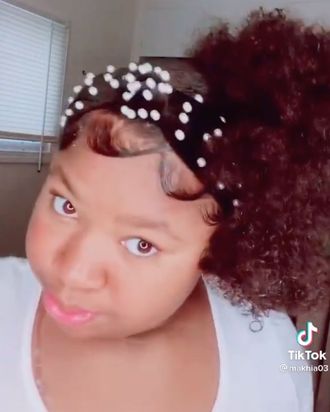
I wish I’d never known Ma’Khia Bryant’s name. Ideally, our only virtual encounter would have gone something like this: A TikTok-fluent teen, she uploads a hair-tutorial video in which she succinctly and expertly lays her baby hairs and pulls her curls into a side ponytail. A 27-year-old millennial, I watch the video on my phone while lying in bed, my own tangle of hair tucked under a bonnet. I notice how she places her finger in order to swoop her baby hairs just so, and make a mental note to try the technique myself sometime. I “like” the post, save it to a collection titled “hair,” and keep scrolling. Maybe my engagement would have been one more small piece of positive feedback, encouraging her to make another video, and another, because she would have had time.
Instead, I learned Ma’Khia Bryant’s name like everyone else when last week she was shot and killed by police in Columbus, Ohio (just minutes before the verdict was released in the Derek Chauvin trial in Minneapolis). According to her mother, 16-year-old Bryant had called the police seeking their help in breaking up a fight. Instead, once they arrived, an officer shot her in the chest after she appeared to lunge at another girl with a knife.
Like so many other people who have died at the hands of police, Ma’Khia’s life has been collapsed into those moments surrounding her death. Her image has been splashed across newspapers and protest signs, hashtags reminding us to #sayhername. The video of the incident made the rounds online, and almost immediately, people began to debate whether her holding a knife was grounds for a police officer to kill her within seconds of arriving on the scene.
To counter this narrative, others began sharing the hair tutorials Bryant had uploaded on TikTok. In each one, a wordless Ma’Khia can be seen conditioning and combing through her thick hair before slicking it into space buns or tying accent braids to frame her face, all over a backing track of neo-soul or ’90s R&B. I no longer watch videos of Black people being killed by police, but seeing these videos of Ma’Khia alive and happy felt almost as gutting.
In them I see not just the carefree innocence of a teenager, not just the hallmarks of an utterly quotidian life — the bunk beds in the background, the affordable beauty-supply-store products she used — I also see the potential of a life snuffed out so soon. It’s difficult to describe the precision it takes to really lay your edges flat against your forehead so that they look purposeful and not just greasy. But Ma’Khia had mastered it. She knew which products to use to make her curl pattern defined and not frizzy. She could apply false eyelashes! At 16, I was struggling to tame my hair with a headband.
Those videos, and what happened to their protagonist, are a reminder that police violence can penetrate even the sacred online spaces I visit. Natural-hair videos, and the community built up around them, have been a necessary balm amid all the other difficult news I consume. Girls like Ma’Khia were there to show me how to finally achieve a wash-and-go and how to stretch my hair without heat, and to remind me to trim my ends often. We created a little world of product recommendations and life hacks just for us.
By teaching one another how to style our hair — hair that for so long has been deemed difficult and ugly by a world centered on whiteness — we show love to one another. We say, “Hey, sis, check out how cute I look! You can look like this too.” This knowledge sharing is an extraordinary, banal gift that Black women give to one another. That an agent of the state would take one of us from the community, and someone so young who had so much left to give, is a remarkable act of violence whose effects ripple far out to places and time immeasurable.
Ma’Khia had a genuine eye for design. I wonder what she would have done with this skill as she got older, how else she would flourish if she had been allowed to. Her mother said that she had just made the honor roll. Maybe Ma’Khia had a knack for biology. Maybe she was a skilled writer. What else could she have done with her talents? Who could she have been in her community, and what more could it have poured into her? All of these questions without answers, because the police took these options from her.
These possibilities are what get obscured when even a well-meaning public turns victims of police violence into symbols of an entire structural problem. In less than a year from the day a Black man in Minneapolis suffocated under the knee of a police officer, the name “George Floyd” has become shorthand for a legacy of racist police violence, a global protest movement against that legacy, and a hundred different corporate entities’ pledges to “reckon with” that legacy. The flattening of an individual into an emblem is how we get Nancy Pelosi thanking Floyd for his “sacrifice,” when all he wanted was to buy some cigarettes on Memorial Day. It’s how we get the memeification of a woman who was shot to death in her sleep.
I am not sure how hard all of us observers really try to imagine these victims in all the fullness and complexity their lives contained. How earnestly we try to grasp the truth that Black people killed by police are neither threats with superhuman strength nor pious martyrs giving their lives over to a larger cause. They are ordinary, fallible people who may or may not be concerned with doing their hair. In Ma’Khia Bryant’s TikToks, we’re afforded a short glimpse of a three-dimensional life. We have a chance to honor the fullness of that life, and not just its end.




